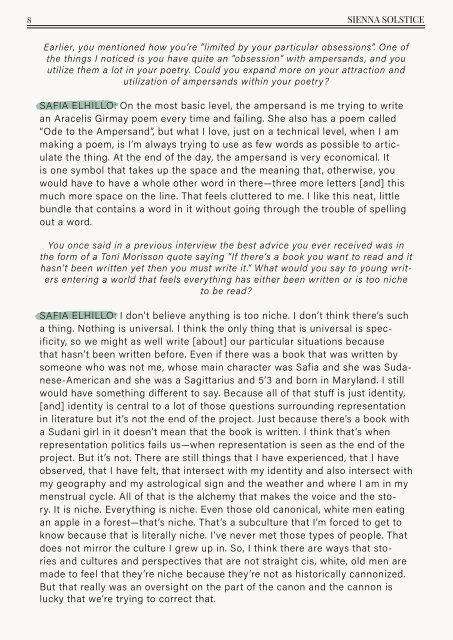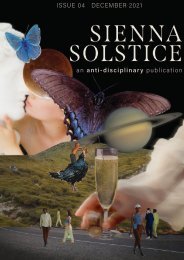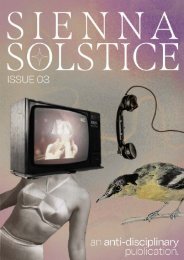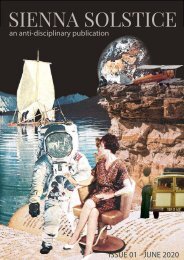ISSUE II
Create successful ePaper yourself
Turn your PDF publications into a flip-book with our unique Google optimized e-Paper software.
8 SIENNA SOLSTICE<br />
Earlier, you mentioned how you’re “limited by your particular obsessions”. One of<br />
the things I noticed is you have quite an “obsession” with ampersands, and you<br />
utilize them a lot in your poetry. Could you expand more on your attraction and<br />
utilization of ampersands within your poetry?<br />
SAFIA ELHILLO: On the most basic level, the ampersand is me trying to write<br />
an Aracelis Girmay poem every time and failing. She also has a poem called<br />
“Ode to the Ampersand”, but what I love, just on a technical level, when I am<br />
making a poem, is I’m always trying to use as few words as possible to articulate<br />
the thing. At the end of the day, the ampersand is very economical. It<br />
is one symbol that takes up the space and the meaning that, otherwise, you<br />
would have to have a whole other word in there—three more letters [and] this<br />
much more space on the line. That feels cluttered to me. I like this neat, little<br />
bundle that contains a word in it without going through the trouble of spelling<br />
out a word.<br />
You once said in a previous interview the best advice you ever received was in<br />
the form of a Toni Morisson quote saying “If there’s a book you want to read and it<br />
hasn’t been written yet then you must write it.” What would you say to young writers<br />
entering a world that feels everything has either been written or is too niche<br />
to be read?<br />
SAFIA ELHILLO: I don’t believe anything is too niche. I don’t think there’s such<br />
a thing. Nothing is universal. I think the only thing that is universal is specificity,<br />
so we might as well write [about] our particular situations because<br />
that hasn’t been written before. Even if there was a book that was written by<br />
someone who was not me, whose main character was Safia and she was Sudanese-American<br />
and she was a Sagittarius and 5’3 and born in Maryland. I still<br />
would have something different to say. Because all of that stuff is just identity,<br />
[and] identity is central to a lot of those questions surrounding representation<br />
in literature but it’s not the end of the project. Just because there’s a book with<br />
a Sudani girl in it doesn’t mean that the book is written. I think that’s when<br />
representation politics fails us—when representation is seen as the end of the<br />
project. But it’s not. There are still things that I have experienced, that I have<br />
observed, that I have felt, that intersect with my identity and also intersect with<br />
my geography and my astrological sign and the weather and where I am in my<br />
menstrual cycle. All of that is the alchemy that makes the voice and the story.<br />
It is niche. Everything is niche. Even those old canonical, white men eating<br />
an apple in a forest—that’s niche. That’s a subculture that I’m forced to get to<br />
know because that is literally niche. I’ve never met those types of people. That<br />
does not mirror the culture I grew up in. So, I think there are ways that stories<br />
and cultures and perspectives that are not straight cis, white, old men are<br />
made to feel that they’re niche because they’re not as historically cannonized.<br />
But that really was an oversight on the part of the canon and the cannon is<br />
lucky that we’re trying to correct that.






